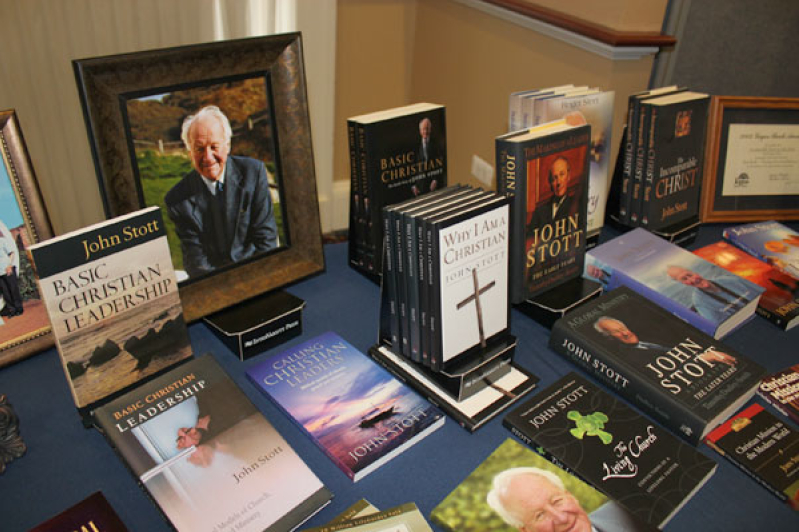
WHEATON, Ill. – Hundreds of Christians inspired and impacted by the life of English evangelical theologian, preacher, and global thinker John Stott gathered at Wheaton College on Friday for his U.S. memorial service.
Intimate stories of a man driven until his last breath to live according to the will of God and make Him known were shared by friends, protgs and evangelical leaders. Stott died on July 27 at age 90.
The following is the biography found in the memorial service program pamphlet.
Remembering John Stott
John Stott shaped much of the course of evangelicalism in the 20th century through his writing and preaching, and in 2005, TIME magazine placed him among the world’s “100 most influential people.” He was chief architect of The Lausanne Covenant (1974) and remained Honorary Chairman of The Lausanne Movement until he died.
The work of Langham Partnership International (John Stott Ministries in the USA) is perhaps his major legacy to the world church. This strategic threefold initiative, now under the direction of Christopher Wright, works to strengthen the church in the Majority World by equipping Bible teachers. John Stott’s own considerable royalties were all “channeled” into the Langham Partnership for the production and distribution of theological books for the global south.
Stott’s father, Sir Arnold Stott, hoped his son would enter the diplomatic service, and his irenic spirit and Cambridge double first in modern languages would have equipped him well for this. But at the age 17 while at Rugby School, he met E.J.H. Nash, who led him to faith in Christ. Nash’s discipleship training, alongside the vibrant life of the Cambridge Inter-Collegiate Christian Union, established John Stott in his faith.
John Stott has been described as “a renaissance man with a reformation theology.” He had remarkable intellectual reach, and always worked to bring his mind under the scrutiny of the Bible. John Stott loved Scripture, and for over 50 years he read the whole Bible through annually. It became a pattern to rise at 5:00 a.m. daily to read and pray.
Stott summed up his priorities as “students and pastors.” He saw the critical nature of the university, and was an energetic vice president of the International Fellowship of Evangelical Students (IFES). While Billy Graham, a long-time friend, was drawing thousands to football stadiums, Stott’s mission field was the university campus. The strategic influence for the gospel could not have been greater. He conducted week-long evangelistic missions for IFES national movements in many of the world’s universities. His warm yet serious style and sheer conviction of Scripture’s authority brought students back night after night.
Through his work with students, “Uncle John” as he was known, met many of the sharpest up-and-coming Christian thinkers worldwide while they were still at the university, and he kept in contact with them as they graduated. He wanted to apply biblical truth to all areas of thought and progress, and would invite sharp thinkers at the new frontiers of science and technology to help him do so.
In 1950, while only 29, he was appointed rector of All Souls Church, Langham Place in London. His gifts in expository preaching were to become widely celebrated, but he sensed the unchurched in his inner-city parish needed more. In 1958, he took the bold step of founding the All Souls Clubhouse, a venture in youth and community work twenty years ahead of its time.
As invitation to travel increased, he was in 1975 given the title Rector Emeritus, and released by the church to serve globally and to write. John Stott then moved from the rectory into a small mews flat built for him above the rectory’s adjoining garage. He remained in this modest one-bedroom home until a fall constrained him to leave it.
Much of his substantial writing – over 50 books translated into 65 languages – was completed at “The Hookses,” a remote cottage on the Welsh coast which he purchased in 1954, in a state of dereliction. John Stott’s books included the million-selling Basic Christianity and the one he always considered his best, The Cross of Christ, which he dedicated to his secretary of more than 55 years, Frances Whitehead. Later books included The Birds our Teachers for which he took almost all the photographers himself. As a self-taught ornithologist, he saw some 2,500 of the world’s 9,000 bird species.
John Stott pioneered several influential movements. Among them was the London Institute for Contemporary Christianity, dedicating to equipping Christians for whole-life discipleship in the secular culture and workplace. His initiatives in drawing together groups of thinkers led to several other ventures such as The Frontier Youth Trust and Tearfund.
Stott served as Chaplain to the Queen from 1959 and then as Extra Chaplain. He was awarded four honorary doctorates in Britain and America. His life and work became the subject of several doctoral theses in his lifetime. He was made a Commander of the British Empire in the Queen’s 2006 New Year Honours list.
The life of this urbane and gracious visionary and strategist who loved the natural world and who determined to express the eternal truth of the Christian gospel to the well-educated, the less privileged, and the dropouts alike will doubtless attract much further attention as future history unveils the extent of his quite extraordinary influence.






